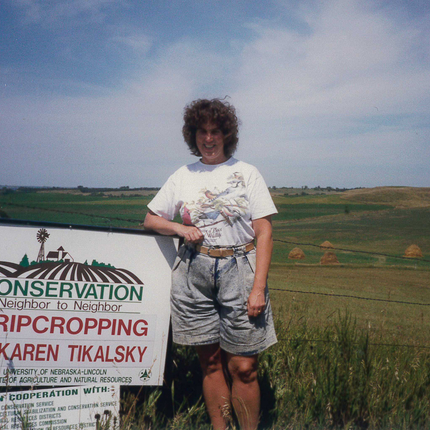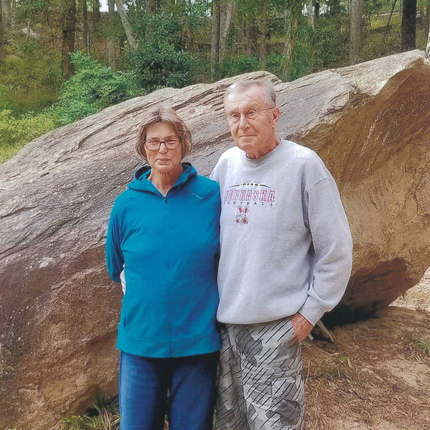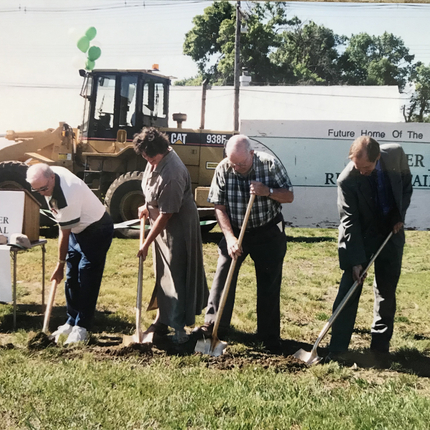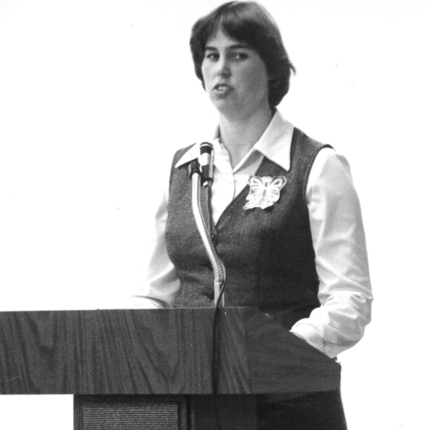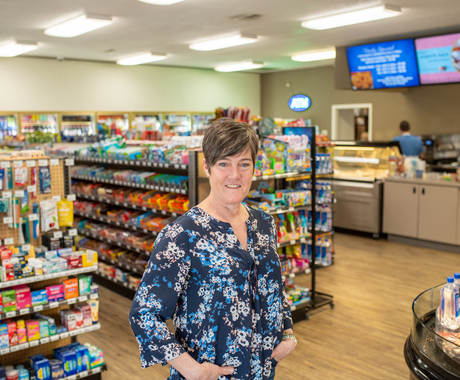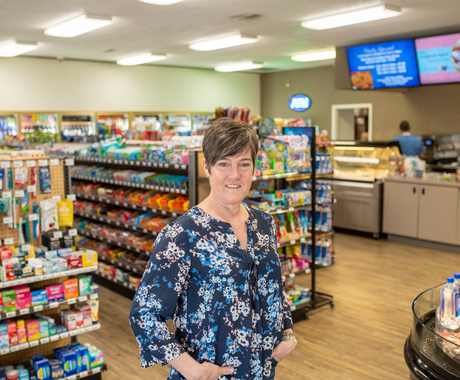As a child, Karen Tikalsky believed good would prevail over evil.
As an adult, she learned that creating opportunity and meaningful life in rural America requires hard work, embracing responsibility, civic action, and advocating for those who cannot advocate for themselves. She hung onto the belief that good would prevail and devoted her life to building a rural America where all families can earn a living and enjoy fairness, peace, and social justice.
To acknowledge Karen and her husband, Jim, for their lifetime of service, the Center for Rural Affairs presents them with the 2020 Seventh Generation Award. The award honors people who have made significant contributions to improving rural life and protecting our land and water.
Karen joined the Center Board in 1986 and served until her death on Jan. 26, 2020, at age 67. She presided as Board president from March 2001 to March 2004, a tenure that included construction of the Center’s current main office building in Lyons, Nebraska.
“She was an advocate for others, for those that couldn’t advocate for themselves,” Jim said.
The self-proclaimed “voice of history” on the Center’s Board of Directors, Karen offered common-sense advice and opinions on the problems rural America faces.
“Things get better when ordinary citizens embrace their responsibility to make things better, by the actions they take in their personal lives, communities, organizations, and government. I am thankful I was able to do some of that, and my wish is those of you reading this or here today will continue to appreciate nature, family, and friends,” Karen wrote in a 2012 letter to her friends and loved ones.
Karen and Jim lived among the rolling Nebraska hills near Niobrara on a farm homesteaded by Jim’s great-great-grandfather and his son in the late 1870s.
As a boy, Jim gathered eggs, milked cows, walked fields with a hoe to root out weeds, and helped thresh hay years before he was old enough to drive.
Karen grew up in Great Falls, Montana, and as a young woman volunteered with organizations that helped give a step up to families who struggled.
She and Jim met through a mutual acquaintance in 1972 at the University of Montana in Missoula. On their first date, she rode on the back of his Enduro motorcycle along forest trails for a picnic with friends.
They got married in 1973, lived briefly in Oregon, then moved to San Francisco.
“Living in San Francisco in 1973 was quite an experience, I must say,” Jim said. “We changed completely from rural America to urban America.”
They tried foods from all over the world and discovered a shared love for music at concerts by bands like The Moody Blues, Jefferson Starship, and the Nitty Gritty Dirt Band.
A wok seasoned by the chef at Five Happiness Restaurant on San Francisco’s Geary Boulevard, where Karen took a cooking class, has a place of honor in the Tikalsky’s Niobrara kitchen nearly five decades later.
During the life Jim and Karen built together, Jim got promoted to an insurance claims investigator and transferred to Medford, Oregon, where Karen began working for the Bureau of Land Management.
In the late ‘70s, a new opportunity opened: Jim’s parents wanted to retire.
Jim and Karen knew farming would mean hard labor, pig manure, knee-deep mud, and narrow profit margins. But, it also would bring bountiful harvests, meaningful work, and community.
Moving to northeast Nebraska’s steep rolling hills to work the farm took adjusting for both of them. Luckily, Jim’s parents stayed close by to act as a sounding board.
“That is always a challenge for families where one has been in charge and (must) relinquish decision making,” Jim said. “That transition took a while.”
He raised farrowing pigs and had a cow and calf operation. In the fields, he rotated oats, corn, alfalfa, and grass hay.
Karen found work with the Knox County social services department disabilities division, then worked as a service coordinator with the Nebraska Department of Health and Human Services, determining Medicaid eligibility for people in the county for 23 years before moving to other assignments and retiring.
Karen and Jim put down roots and grew them deep. They wanted to farm in a way different from the conventional row cropping mentality espoused by former Secretary of Agriculture Earl Lauer Butz: “Get big or get out.” They took a long-term, generational view of farming. They cared about the highly erodible hills of their farm and the neighbors who made up their community.
Jim and Karen participated in early Center programs, including the Small Farm Resources Project, which inspired Jim to begin rotational grazing, eventually restore his pastures to grassland, and implement a rotational grazing system as a tool to maintain it.
“The Center has been dear to my heart since we started farming in 1978. It was during the farm crisis of the ‘80s that I became a Board member,” Karen had said. “In the ‘80s, the Center was instrumental in proposals to change the farm bill and the way farmers were paid for being in farm programs and to add conservation measures.”
Karen represented and championed women, family farmers, and low-income communities. During her life, she encouraged others to support the Center to help convey the ever-changing dynamics in rural America.
Karen and Jim have a daughter, Jacque (Mychajlo) Eliaszewskyj of Fort Benning, Georgia; son, Alan Tikalsky of Lincoln, Nebraska; and three grandchildren, Lydia, Natalia, and Viktor Eliaszewskyj.

